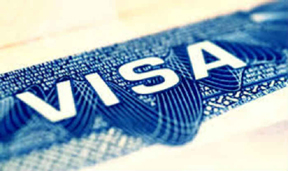 WASHINGTON: Ten Indian-Americans are among 21 people arrested as part of a sting operation in which a fake university was created by US authorities to expose a visa scam that allowed more than 1,000 foreigners to maintain student and work visas.
WASHINGTON: Ten Indian-Americans are among 21 people arrested as part of a sting operation in which a fake university was created by US authorities to expose a visa scam that allowed more than 1,000 foreigners to maintain student and work visas.
In a nationwide sweep federal authorities arrested 21 people in New York, New Jersey, Washington and Virginia.
“These defendants arranged to obtain visas by having individuals enroll in a fake university. Unfortunately for them, that fake university was run by undercover agents of the Department of Homeland Security,” Paul J Fishman, US Attorney for New Jersey, told reporters.
The arrested people were brokers, recruiters and employers who unlawfully and fraudulently obtained or attempted to obtain student visas and foreign worker visas for approximately 1,000 foreign nationals from 26 countries.
It is learnt that a large number of students who received necessary visa and permits to work in the US as a result of the sting operation for which they reportedly paid huge sums of money are from India.
Officials, however, did not give the number of Indian students who were trapped by this year-long sting operation done by immigration and law enforcement authorities.
While the US Government did not reveal the nationality of the arrested people, names released by authorities indicate that 10 of them are either Indians or of Indian-origin.
Those names include: Tajesh Kodali, Jyoti Patel, Shahjadi M Parvin, Narendra Singh Plaha, Sanjeev Sukhija, Harpreet Sachdeva, Avinash Shankar, Karthik Nimmala, Govardhan Dyavarashetty and Syed Qasim Abbas.
These people arrested for their involvement in an alleged scheme to enroll foreign nationals as students in the University of Northern New Jersey, a purported for-profit college located in Cranford, New Jersey (UNNJ).
Unbeknownst to the defendants and the foreign nationals they conspired with, the UNNJ was created in September 2013 by special agents of Homeland Security Investigations (HSI).
“Pay-to-Stay schemes not only damage our perception of legitimate student and foreign worker visa programs, they also pose a very real threat to national security,” Fishman said.
The HIS sting investigation was carried out to unearth the unauthorized networks and educational institutions that are “nothing more than sham visa mills”, he said, adding that these educational institutions have no curriculum, no classes, no instructors and no real students.
“These purported schools and their corrupt administrators simply give out I-20 forms in exchange for payment,” he said.
“This illegal practice is known as ‘pay to stay’ because foreign nationals pay money to brokers and recruiters, like the defendants, to be enrolled in a school for the sole purpose of obtaining immigration status as a student but with no intention of or interest in going to class or making any progress toward an academic degree,” Fishman said.
To catch these recruiters, HIS developed an undercover investigative strategy that involved the creation of a school called the University of Northern New Jersey or UNNJ.
Although UNNJ was physically located in New Jersey, in a real building in Cranford, the university was not a real school. Its only employees were undercover HIS agents posing as corrupt administrators.
The school had no instructors or educators; it had no curriculum; and no actual classes or educational activities ever occurred there.
Once word got out, brokers descended on the school, clamoring to enroll their foreign student clients.
But as the complaints also allege, the defendants did so while fully aware that those clients wouldn’t be attending any classes at the university, wouldn’t be furthering their educational goals, and wouldn’t be getting a degree.
Instead, UNNJ was just another stop on the “pay to stay” tour.
The undercover agents specifically told each defendant in conversations that were secretly recorded that the university was a sham devised to get immigration status for foreign nationals, Fishman said.
In exchange for their illegal services, the defendants made money in several different ways.
Some defendants had their foreign national clients make payments to the university disguised as tuition and then the defendants received kickbacks or “commissions” from the university.
Other defendants charged their clients thousands of dollars and then the defendants made sham tuition payments directly to the university.
In one case, a defendant gave an undercover agent a USD 7,000 watch as “tuition fees” for seven purported student, Fishman said.
He told reporters that to further complete the illusion, the complaints allege that virtually every defendant knowingly purchased fake documents from the undercover university, including fraudulent transcripts with made up classes and grades; diplomas; attendance sheets; student ID cards; sham receipts; and even phony parking passes.
In the majority of instances, the undercover agents e-mailed blank templates to the defendants, who then with their clients filled in the phony information (such as classes and grades for transcripts) and e-mailed these false documents back to the agents. .
The agents then placed the university s letterhead on the forms, printed and signed them and e-mailed them back to the defendants, he said.
Fishman said in addition to this “pay to stay” scheme, several defendants were involved in H1-B fraud, that is, visas that allow foreign nationals to lawfully work in the United States.
These defendants requested that undercover agents create phony Information Technology projects at the university, like software development.
Although the defendants were explicitly told by undercover agents that the university had no need for any such projects, at least three of the charged defendants requested and paid thousands of dollars for a variety of false documents from the university to trick USCIS into issuing H1-B visas to the defendant s foreign national employees.
For example, Syed Abbas, from New York, is the owner of Fastnet Software International, an information technology staffing and consulting company.
He purchased a lot of false documents from undercover agents and petitioned USCIS on behalf of approximately 20 foreign workers. None of these visas were issued, he said. –PTI






